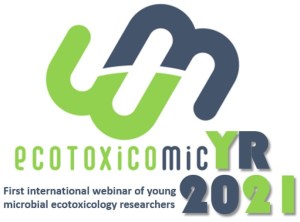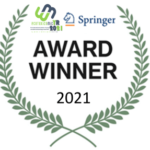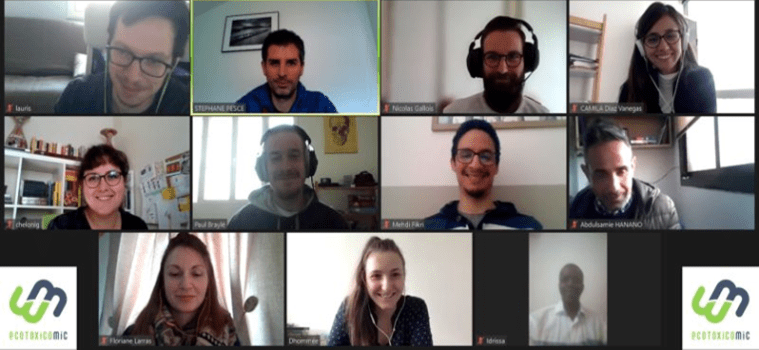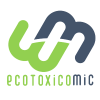EcotoxicoMicYR_2021
- Home
- EcotoxicoMicYR_2021
First international webinar of young microbial ecotoxicology researchers
What is EcotoxicoMicYR ?

Organized by and for young microbial ecotoxicologists, this series of three half-day webinars will take place each Monday afternoon (Paris time zone) from November 22, 2021 to December 6, 2021.
International keynote speakers, Ph.D. students, Post-Docs and MS. c. students will present their research in Microbial Ecotoxicology to the international community as flash or classic presentations.
Abstract submission is now closed.
It will be free and open to everyone!
More information about the scientific and organizing committee, keynote speakers, sessions, abstract submission or presentation awards is available on the dedicated pages.
Registration is open !
- Just complete the form in the link below
- And get register for our webinar
Keynote Speakers
We are happy to announce the confirmed participation of our three internationally renowned keynote speakers (one for each half-day webinar)

Pr Fabio ROLDAN

Dr Belinda FERRARI

Dr Ahmed TLILI
Inorganic and organic contaminants released in natural environments may undergo multiple processes of abiotic and biotic transformations, which determine their environmental fate and persistence in the ecosystems. Microorganisms have evolved multiple strategies to respond to contaminant toxicity and to detoxify their intracellular and extracellular environment. The metabolic capacities of the microorganisms to transform complex and hazardous compounds in less toxic, less persistent and less bioavailable structures play a determinant role in contaminant fate and have great potential to treat and restore polluted ecosystems.
This session welcomes studies at laboratory-scale or in-situ field-scale trials focusing on the role of microbial species and communities on contaminants dynamics and bioremediation in natural environments. Specifically, we invite contributions of doctoral and postdoctoral students developing innovative projects that focus on: i) studies of microbial processes that determine contaminant speciation, sequestration and biotransformation; ii) bioremediation of contaminated soil, sludge or aquatic environments, iii) molecular biology applications to bioremediation. Works that explore the current challenges in the field by integrating innovative chemistry, microbiology, ecological approaches and modelling are particularly welcomed.
Keywords: chemical speciation, environmental fate, bioavailability, detoxification, ecosystems restoration
Microbial communities play a crucial role supporting key ecosystem functions in any biotope. Facing environmental stress, microorganisms have developed a wide range of evolutionary and physiological adaptation mechanisms that allow them to remain active and survive. Physiological responses to stress can be explored at different levels (from cell to ecosystem through the population). The stress induces physiological cost that can result in visible alterations on the ecosystem. The other way around is also noticeable with large-scale impacts resulting on modification of active microbe’s physiology. This session welcomes studies aiming to understand the consequences of chemical, environmental or biological stressors on microbial community structure and diversity and on physiological responses, with emphasis on determination of consequences on the ecosystem functioning.
Keywords: physiological response, diversity changes, adaptation, functional impairment, resistance and resilience
This session is dedicated to the cutting-edge approaches recently developed and applied to microbial ecotoxicology. The originality of these techniques provides unprecedented insights. The field of microbial ecotoxicology is evolving exceptionally quickly, partly because it can benefit from the new developments in, among others, molecular biology, microscopy and high-throughput omics. In addition to allowing for better understanding of microbes and their interactions with contaminants, the new developments in these fields pave the way for new discoveries. This session is specifically aimed at the newest and innovative approaches.
Keywords: emerging approaches, innovating methods
Microbial communities are placed at the basis of many ecosystems and environmental compartments, from soil to surface waters and can be hosted in a wide spectrum: from organisms to organs. Interaction networks taking place in animals’ organs (e.g. gut, skin, etc.), plants and within aquatic ecosystems or soils result from the production of metabolites by one compartment benefiting the other for its metabolism or biomass production. Together, these beneficial interactions contribute to the harmonious balance of these particular ecosystems. The roles and relationships microbial communities undertake may be modified or even jeopardized by the exposure of different types of pollutants, leading to broader consequences on hosts’ health and finally ecosystems. This session aims to bring together works in terrestrial and aquatic environments on both host-associated and free-living microbial communities.
Keywords: altered biotic interactions, co-occurrence networks, trophic chain, microbiota
Microbial communities are placed at the basis of many ecosystems and environmental compartments, from soil to surface waters and can be hosted in a wide spectrum: from organisms to organs. Interaction networks taking place in animals’ organs (e.g. gut, skin, etc.), plants and within aquatic ecosystems or soils result from the production of metabolites by one compartment benefiting the other for its metabolism or biomass production. Together, these beneficial interactions contribute to the harmonious balance of these particular ecosystems. The roles and relationships microbial communities undertake may be modified or even jeopardized by the exposure of different types of pollutants, leading to broader consequences on hosts’ health and finally ecosystems. This session aims to bring together works in terrestrial and aquatic environments on both host-associated and free-living microbial communities.
Keywords: altered biotic interactions, co-occurrence networks, trophic chain, microbiota
Wherever microorganisms evolve in soil, water or sediment, they have to cope with a wide variety of factors that occur simultaneously. Those factors can be directly linked to anthropogenic activities (e.g. contamination by pollutants) and climatic extreme events (e.g. changes in temperature and drought). Because such complex systems make the characterization of micropollutant effects on microorganisms difficult, unraveling interactions between micropollutants and other stressors is a rising challenge in ecotoxicology.
This session welcomes studies investigating the effects and/or the nature of the interactions between two or more micropollutants or between micropollutants and/or other stress factors on microbial species and communities. We invite contributions of doctoral and postdoctoral researchers that are developing laboratory and in situ investigations at different levels of biological organization (molecular, cellular, population and community). Research works that took into consideration realistic exposure scenarios or multiple exposure time scales and sequences are particularly welcomed. Studies dealing with modeling (e.g. mixture effect prediction) could also fit to this session.
Keywords: altered biotic interactions, co-occurrence networks, trophic chain, microbiota
Detailed program
/!\ The program is given with France time zone hours /!\
13h20 – 13h30 - Opening of EcotoxicoMicYR 2021
13h30 – 13h45 - Presentation of the first international webinar of young microbial ecotoxicology researchers; Paul Braylé & Camila Diaz Vanegas
13h45 – 14h30 - Keynote Speaker: Fabio ROLDAN: Bioremediation case studies from the lab to the field: dealing with recalcitrant compounds
14h30 – 15h50 - Session 1 – Part 1: The role of microorganisms on contaminant dynamics, biotransformation and bioremediation; Chairmen: Giulia Cheloni & Camila Diaz Vanegas
Manhattan Lebrun - Rehabilitation of mine soils by phytostabilization: Does soil inoculation with microbial consortia stimulate Agrostis growth and metal(loid) immobilization?
Maria Prieto - Effect of water table dynamics on bacterial diversity and dichloromethane biodegradation
Anaïs Espinosa - Biodegradation by activated sludge and feedback impact on the microbial community: comparison of methotrexate and its eco-designed analogue
Roxane Dhommée - Implementation of a preventive natural bioremediation process for agricultural soils to limit the pesticide diffusion into the environment
15h50 – 16h20 - Coffee break - Flash presentations (session 1)
16h20 – 17h20 - Session 1– Part 2: The role of microorganisms on contaminant dynamics, biotransformation and bioremediation ; Chairmen: Giulia Cheloni & Camila Diaz Vanegas
Guillaume Holub - Study of bacterial communities in several naturally radioactive mineral sources in Auvergne (Massif Central, France) and their role in uranium biogeochemistry
Katharine Thompson - Glyphosate degradation by two novel Ochrobactrum pituitosum strains
Camila Diaz-Vanegas - On-site Treatment of Arsenic-rich Acid Mine Drainage by Sulfate Reducing Bioreactor
13h30 – 13h35 - Introduction of the day; Paul Braylé & Nicolas Gallois 13h35 – 14h20 - Keynote Speaker: Belinda FERRARI: Using microbial communities as indicators of soil health in the Antarctic environment 14h20 – 15h20 - Session 2: Microbial responses to contaminants across multiple levels of biological organization; Chairmen: Lauris Evariste & Roxane Dhommée & Nicolas Gallois Angela Ares - Differential molecular responses in the deep sea hydrothermal vent Epsilon-proteobacteria Nitratiruptor SB155-2 under Cd and Cu stress Ingrid J. C. Rijk - Microbial nutrient cycling measured in situ in a lead polluted grassland Anastasia Tsiola - Viral and prokaryotic community responses upon exposure to silver nanoparticles versus silver ions in coastal seawater 15h20 – 15h50 - Coffee break - Flash presentation (session 2,3 & 4) 15h50 – 16h50 - Session 4: Impacts of contaminants on biotic interactions; Chairmen: Lauris Evariste & Roxane Dhommée & Nicolas Gallois Elisa Catão - Biodiversity as an indicator of microbial interactions against ARG dissemination in the environment Lilian Gréau - Response of Populus x canadensis and associated fungal endophytic communities to a PAH contamination gradient Olwen Simenel - Influence of plants on RND efflux pumps and resistance to antibiotics and contaminants 16h50 – 17h30 - Session 3: Emerging approaches in microbial ecotoxicology; Chairmen: Lauris Evariste & Roxane Dhommée & Nicolas Gallois Sylvia THIEFFRY - Predicting pesticide biodegradation potential from microbial community composition: new tools for bioremediation Vincent FERNANDES - Volatolomics: a relevant approach for toxicological and ecotoxicological experiments
13h30 – 13h35 - Introduction of the day; Paul Braylé & Floriane Larras 13h35 – 14h20 - Keynote Speaker: Ahmed TLILI: Aquatic biofilms in a changing world : why they matter when assessing impacts of multiple stressors? 14h20 – 15h40 - Session 5: Use of microorganisms for environmental quality assessment; Chairmen: Floriane Larras Sarah Cheron - In situ exposure to glyphosate induces tolerance acquisition by phototrophic biofilms: the case study of the Cleurie river (France, Vosges moutains) Olga Lamprecht - Establishment and application of a synthetic freshwater periphyton community as a model system Nicolas Gallois - Wastewater Reuse: fate of mobile genetic elements vector of antibiotic resistance during field irrigation with reclaimed water Vincent Laderriere - Using Biofilms as Bioindicators of Metal Contamination in Stream Ecosystems: Towards the Development of a Predictive Accumulation Model 15h40 – 16h10 - Coffee break - Flash presentations (session 5 & 6) 16h10 – 17h10 - Session 6: Exposure of microorganism to multiple stressors: combined responses and effects; Chairmen: Floriane Larras Louis Carles - Role of wastewater microorganisms in the establishment of tolerance to micropollutants in stream periphyton Zeina Bourhane - Microbial diversity as biomarker of contamination in soil-river-lake continuum Laura Kergoat - Combined effects of clogging and copper-contaminated water on microbial communities in the hyporheic zone 17h10 – 17h40 - Presentation of the Peer Community In initiative 17h40 – 17h55 - Award ceremony & Closure of the first international webinar of young microbial ecotoxicology researchers
Your access to the webinar
We will be using SpatialChat for our webinar. If you are not familiar with this tool, click below to discover it.
A support during the three afternoons will be provided to all participants.
Awards

Thanks to a grant from the Environmental Science and Pollution Research (ESPR) Journal (Springer), the three Best Live Presentations will receive an award.
Each afternoon will see the best presentation rewarded.
The awarded PhD Students and Post-Docs will be invited to present their work as invited speakers at the EcotoxicoMic 2022 Conference (Montpellier, France, 15-18 November 2022)
Presentation Guidelines
All presentations must be in English.
Live presentation
Your presentation can not exceed 12 minutes. The D-day, you will be sharing your own screen for your presentation.The presentations will be followed by 5 minutes of live questions and answers. This format is similar to classic conferences and we recommend roughly one slide per minute. PowerPoint or PDF are the preferences.
Please send your presentation in pdf format to us (ecotoxicomicyr@gmail.com) as a back up 4 days before your presentation date (Thursday evenings), the latest.
A zoom link will be available in order to test your presentation on the platform.
Flash presentation
Your presentation can not exceed 3 minutes and must be recorded before the 15th November (whether the afternoon we asked you to be present).
Once recorded, please send it to us by an email at ecotoxicomicyr@gmail.com
If the file is too big, use a transfer file service (e.g. Wetransfer)
A tutorial is available below to explain how to record your video presentation from PowerPoint (https://www.youtube.com/watch?v=2m60HT3OMOI&ab_channel=PresentationMastery).
Abstract submission
Abstract submission is now closed.
Abstract submission is opened for young researchers (PhD Students and Post-Docs) and MS. c. students (for Flash presentation only).
Two types of presentation are possible:
- Live presentation in 12 min (for PhD students and Post-Docs)
- Pre-recorded flash presentation in 3 min (for PhD students, Post-Docs and MS. c. students)
The use of the Abstract Template is mandatory and the abstracts must be prepared in English (Abstracts should not exceed 350 words).
The abstracts which do not follow the format carefully will be sent back to the author(s) to be revised.
Once you prepared your abstract according to the above guidelines, submit your abstract to ecotoxicomicYR@gmail.com.
After successful submission, receipt acknowledging the abstract will be sent via an email within several working days.
Notification of acceptance of abstracts will be sent by early September.
Scientific and Organizing Committee
The Scientific and Organizing Committee is composed of francophone Ph.D. Students and Post-Docs, accompanied by three senior scientists members of the board of the EcotoxicoMic Network.

BRAYLE Paul (Institut National Polytechnique de Toulouse, FRANCE)
DHOMMEE Roxane (Université Clermont Auvergne, FRANCE)
DIAZ VANEGAS Camila (Hydroscience Montpellier, FRANCE)
FIKRI Mehdi (University of Orléans, FRANCE)
SOUMAORO Idrissa (Université de Lomé, TOGO)
CHELONI Giulia (INRAE, SupAgro, Montpellier, FRANCE)
EVARISTE Lauris (INRAE, Toulouse)
GALLOIS Nicolas (CNRS, LCPME, Vandoeuvre les Nancy, FRANCE)
LARRAS Floriane (INRAE, Paris, FRANCE)
CEBRON Aurélie (CNRS, Université de Lorraine, Nancy, FRANCE)
HANANO Abdulsamie (Atomic Energy Commission, Damascus, SYRIA)
PESCE Stéphane (INRAE, Lyon-Villeurbanne, FRANCE)
